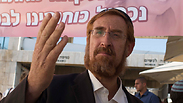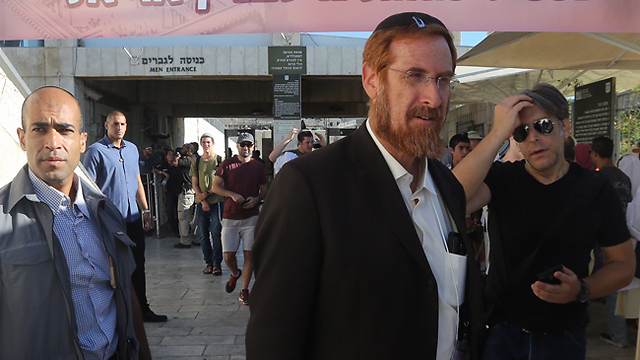
Glick
Photo: Yoav Dudkevitch
MK Rabbi Yehuda Glick (Likud) intends to file a petition to the High Court of Justice against Prime Minister Benjamin Netanyahu’s ban on parliamentarians’ visiting the Temple Mount.
For the past ten months, Glick has allegedly been trying to ascertain under what authority Netanyahu, who also leads the party of which the rabbi is a member, ordered the police to prevent MKs from visiting the controversial location, which is the holiest site in the Jewish religion and the third holiest to faithful Muslims.
Jews who do not serve in the Knesset are permitted to visit but are barred from praying for fear of tension with Muslims, and Israeli security forces control entry.
Glick, who only took his Knesset seat in May following Moshe Ya’alon’s resignation, has been meeting with the attorney general and the Knesset’s legal advisors on the matter. They apparently told him that Netanyahu’s ban would not pass High Court scrutiny.
The MK also summoned representatives of the Israel Police, including the commander of the Jerusalem District, to the Knesset to declare that no security risk would be posed by lifting the prime minister’s ban.
Glick explained, “For a long time, members of Knesset, in violation of the law, have not been allowed to visit the mount. This is in opposition to the Basic Laws of Freedom of Worship and Freedom of Movement.”
While there are no such Basic Laws or explicit guarantees thereof in other semi-constitutional legislation in the State of Israel, the Supreme Court has previously held the former is included in the Basic Law: Human Dignity and Liberty. In 1997, then-Supreme Court President Aharon Barak wrote in his judgment on Horav v. Minister of Transport that the latter is “among the most basic rights.”
Glick further alleged that the ban violates the Knesset Members’ Immunity, Rights and Duties Law and the Protection of Holy Places Law.
Though he claimed that his position was confirmed by the heads of the police and the legal advisors he had consulted, Glick said, “The prime minister has been refusing to talk with me about the matter for many months. I sent him a message that I’ll be forced to petition (the High Court), but it didn’t help. This discrimination is intolerable…The prime minister can’t issue an illegal order to the police.”
As the ban applies to all members of the Knesset, Arab MKs have also opposed it. Some have outright flouted the ban or attempted to.
Glick commented, “ I would really like Arab MKs to submit the petition with me, but they unfortunately aren’t ready to collaborate with me on the Temple Mount issue.”
In September 2014, when he was a private citizen—though a prominent right-wing activist who encouraged Jewish prayer on the Temple Mount—Glick was temporarily banned from the Temple Mount by a police order. This was following the allegations of a 67-year-old woman that the rabbi had pushed her over and broken her arm at the site.
The following month, Glick was seriously wounded after being shot at an event in Jerusalem entitled “Israel Returns to the Temple Mount.” A day later, police shot and killed his suspected attacker, Muataz Hijazi, a Palestinian from east Jerusalem.
Glick is expected to file his petition at the beginning of next week.

















